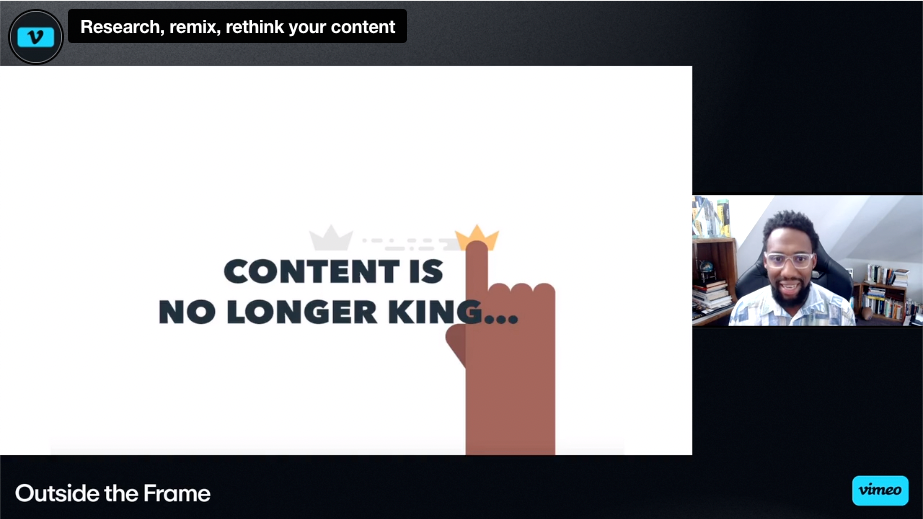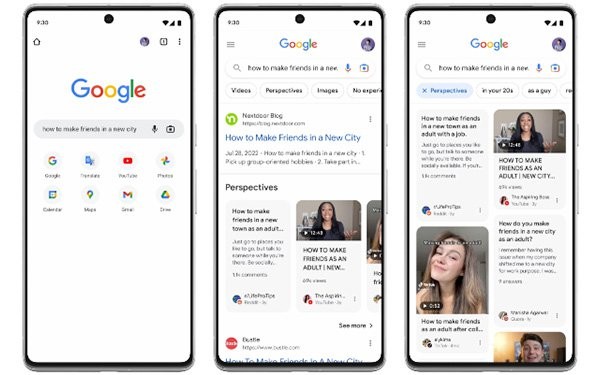The digital world is changing fast as generative AI and evolving social media transform our online behavior, how we access information, and how brands connect with audiences.
The influence of AI is growing stronger, fundamentally altering the way we interact with online content and how brands make their digital footprint. Nothing shows how mainstream the use of generative AI has become more than Google’s incorporation of AI-generated answers at the top of search results. This new feature, Search Generative Experience (SGE), reduces brands’ opportunity to answer their audience’s common questions and drive traffic with branded content. Not only does SGE provide immediate answers, potentially eliminating the need to visit additional sources, but its placement at the top of the page pushes other results further down, reducing their chances of being discovered.
Likewise, social media is changing how we consume news. More people are turning to platforms like TikTok and Threads for news updates, with some influencers taking on more of a reporting role for their followers.
So, what does this mean for marketing communications programs as we move into 2024?
EMBRACE THOUGHT LEADERSHIP
As generative AI churns out more content, Google Search is prioritizing high-quality content, especially the kind that only humans can create — unique insights and expertise. In fact, Google updated its original framework for evaluating the quality of content — E-A-T: Expertise, Authoritativeness and Trustworthiness — to include an additional E for Experience, which considers if the author has real expertise with the topic. LinkedIn has echoed this move, changing its algorithm to favor posts that share knowledge and insights over personal news.
As the value of thought leadership steadily climbs, your SMEs and their unique perspectives will be more critical than ever for driving visibility online, differentiating your brand, and building credibility.
DISTRIBUTION TAKES THE THRONE
With so much AI-generated noise out there, it’s more challenging to stand out than ever before. The solution isn’t generating as much content as you possibly can. If you go that route, the odds are that your content will be sub-par and your rankings will drop on Google because you aren’t meeting their content quality standards.
Ross Simmonds put it perfectly during his session at Vimeo‘s Outside the Frame digital conference: Content is no longer king, distribution is.

Shift away from volume and instead focus on crafting and maintaining fewer, high-quality pieces and distributing them across various channels over and over again. Consider each piece a long-term asset that you can continuously refresh, repurpose, and reformat in different ways so they stay relevant and continue to drive value over time.
EXPAND TO NEW CHANNELS
Extend your presence across a broader range of digital channels, especially on social platforms and discussion forums. Active engagement from your brand and its thought leaders can help improve your content’s visibility on search engines like Google.
In addition to SGE, Google also rolled out its Perspectives filter this year. Just like how you can filter your results to display news articles, Google Perspectives exclusively shows content posted by individuals. This content includes long- and short-form videos, images, and written posts shared by people on discussion boards, Q&A sites, social media platforms, and blogs. Prioritize posting your thought leaders’ content to these channels to increase your chances of ranking in Perspectives.

INCORPORATE B2B INFLUENCERS
Influencer programs have been a staple in the B2B world for some time. But given the recent changes in the digital landscape, we expect brands to shift from simply paying influencers to post about a brand to building meaningful collaborations that bring real value to their audiences.
A few key forces are driving this change. First, and maybe most significantly, AI is taking the fear out of writing. With AI as a supportive co-pilot, more experts are gaining the confidence to share their knowledge online, bringing more voices into the conversation and broadening the pool of influencers relevant to B2B sectors. Meanwhile, platforms like TikTok are reshaping the influencer revenue model, offering subscription options akin to SubStack that can turn creators into mini-publishers managing and sharing content on social media.
At the same time, more people are flocking to social media for news, and influencers are increasingly stepping up as sources of information, blurring the boundaries between journalism and influencer content. But not all social platforms are on the same page when it comes to displaying news. Some – Facebook, X, and Threads – have taken a step back from news, cutting features and adjusting algorithms to deprioritize news posts. Others – TikTok and LinkedIn – are embracing the trend. LinkedIn’s algorithm now favors posts sharing knowledge and insights, encouraging individuals to add their perspectives to stories relevant to their professional community. Meanwhile, TikTok is emerging as a go-to source for more on the latest breaking news stories, fueled by the platform’s real-time, raw narrative style.
Lastly, Google Search’s Helpful Content System, which launched last year to weed out clickbait and enhance result quality, values a mix of perspectives and hints at the advantages of collaborating with external experts and influencers to enrich your content and make it more audience-friendly.
STAY RESPONSIVE TO THE TRANSITIONING LANDSCAPE
News outlets are at a crossroads as they feel the impact of social media changes and AI. The platform updates made by Facebook and X have caused dramatic drops in traffic to news and media websites. (For more on this, take a look at this piece from Allison Carter at Ragan Communications and PR Daily). And while LinkedIn and TikTok encourage news-focused posts, they work hard to create an environment where users don’t want to exit to visit a separate site.
This comes at a time when traditional newsrooms are already under strain. Newsrooms continue to get smaller, and what’s left of teams are also grappling with a rise in misinformation. Altogether, this is putting more pressure on journalists to choose stories that will increase clicks and to source solid data and insights from industry experts to support their coverage. It also means they have a lot less bandwidth for softer news and evergreen storylines.
News providers are also racing to stand out in this new digital reality. Conversations around how news sites might incorporate AI are starting to grow. Jeff Jarvis, author of The Gutenberg Parenthesis, has talked about how the future of media might be more conversational with news sites incorporating LLMs so visitors can “chat” with specific articles, journalists, or the publication. For now, though, publishers are making smaller yet meaningful shifts to differentiate themselves. For instance, last year, Bloomberg beefed up its data journalism team and ramped up AI coverage with new hires like Leon Yin, Shirin Ghaffary and Seth Fiegerman. Meanwhile, TIME is leaned into opinion content with its Time100 Voices initiative, aligning with Google’s signal to prioritize thought leadership content.
Moving forward, your media outreach should incorporate a focus on data-driven storytelling, unique thought leadership perspectives, and storylines tied to the current news landscape.
In the coming months, navigating these digital shifts will be crucial for marketing communications professionals. Staying ahead of these trends, adapting new strategies, and finding fresh ways to connect with our audiences will ensure we continue communicating effectively in a digital-first world. By embracing these changes, we can not only keep up with the evolving digital narrative but also discover new opportunities to enhance our brands’ presence and engagement online.



